Perverting the Law, Just Another Day on the Bench
“A court cannot ignore clear and precise statutory language. Judicial interpretation allows a court to resolve statutory ambiguities, not create them.”Repeatedly, the United States Supreme Court has affirmed that “when the terms of a statute are unambiguous, judicial inquiry is complete” and “when a rule (or a statute) is clear, a court cannot distort its meaning.”
Yesterday, for the second time in two months, Durham County Superior Court Judge Orlando Hudson has decided that he has power that both the North Carolina and United State Supreme Courts do not. Placing himself above the law, Judge Hudson continues to ignore the clear and precise statutory language of NCGS 7A-66.
WRAL reported Judge Hudson's latest decision as follows:
“For the second time in two months, a local resident has filed court papers seeking the removal of Durham County District Attorney Mike Nifong from office.In denying the motion asking him to follow the unambiguous statutory directives of NCGS 7A-66, Judge Hudson again defies the will of the State Legislature and ignores the precedent set by higher courts.
"But a judge overseeing the case said he would again deny the motion.
“Elizabeth Brewer filed a civil complaint against Nifong in February, alleging willful misconduct and conduct prejudicial to the administration of justice that brings the office into disrepute. The charges stemmed from his handling of the investigation of sexual assault allegations against members of the Duke University lacrosse team.
“Superior Court Judge Orlando Hudson delayed any action on the complaint until an ethics case filed by the North Carolina State Bar against Nifong for his handling of the Duke lacrosse case is completed.
“Hudson told WRAL on Monday he would deny Brewer's motion again, because ruling on it would deny Nifong's right to due process before the State Bar.”
The language of NCGS 7A-66 is clear:
“A proceeding to suspend or remove a district attorney is commenced by filing with the clerk of superior court of the county where the district attorney resides a sworn affidavit charging the district attorney with one or more grounds for removal. The clerk shall immediately bring the matter to the attention of the senior regular resident superior court judge for the district or set of districts as defined in G.S. 7A-41.1(a) in which the county is located who shall within 30 days either review and act on the charges or refer them for review and action within 30 days to another superior court judge residing in or regularly holding the courts of that district or set of districts.”When faced with an appeal on a previous 7A-66 ruling, the North Carolina Supreme Court demonstrated the clear and precise language of the statute when it outlined the precise statutory directive as follows:
“It is true that a district attorney removal proceeding under N.C.G.S. § 7A-66 is an inquiry; it is neither a civil suit nor a criminal prosecution. It is commenced by the filing of one or more sworn affidavits with the clerk of superior court of the county where the district attorney resides. N.C.G.S. § 7A-66. The matter is then brought to the attention of the senior regular resident superior court judge who within thirty days shall act on the charges or refer them to another superior court judge to be acted upon.”In rationalizing his initial decision to delay acting on the affidavit in February, Judge Hudson distorted the meaning of the word “act” to include the “act” of not acting. The News & Observer described Hudson's perversion of the statute as follows:
“The meaning of 'act'Citing Scales v. United States, the US Supreme Court in Aptheker v. Secretary of State stated:
“The disagreement may be over the definition of the word "act."
“Brewer and her attorney believe that under the law, Hudson has to actually consider the petition within a month. Hudson said Monday that by postponing the petition, he has acted on it.”
"It must be remembered that "[a]lthough this Court will often strain to construe legislation so as to save it against constitutional attack, it must not and will not carry this to the point of perverting the purpose of a statute . . ." or judicially rewriting it."In Durham, however, it must be remembered that, although the Supreme Courts of North Carolina and the United States must not and will not strain to the point of perverting or judicially rewriting statutes, the Superior Court will often strain to construe legislation so as to save a rogue prosecutor a few more months in office.





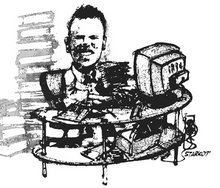
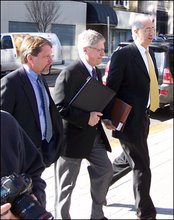
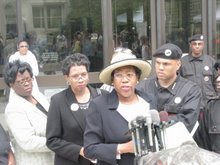
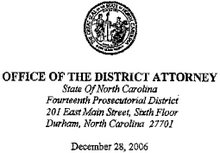
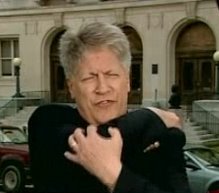

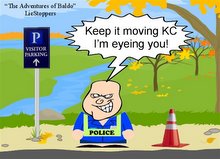

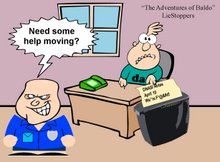

















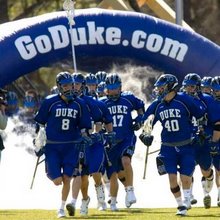







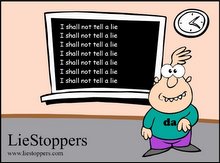






4 comments:
First it was "is" and now it is "act" - so why should anyone be surprised?
Right - If it were that easy - why bother with the Anyone but Nifong campaign. This should have filed immediately. It was obvious this was going no where.
Anonymous:
So what happens now? Appeal?
Sorry to use up alot of space...but check out what the statute actually says
§ 7A 66. Removal of district attorneys.
The following are grounds for suspension of a district attorney or for his removal from office:
(1) Mental or physical incapacity interfering with the performance of his duties which is, or is likely to become, permanent;
(2) Willful misconduct in office;
(3) Willful and persistent failure to perform his duties;
(4) Habitual intemperance;
(5) Conviction of a crime involving moral turpitude;
(6) Conduct prejudicial to the administration of justice which brings the office into disrepute; or
(7) Knowingly authorizing or permitting an assistant district attorney to commit any act constituting grounds for removal, as defined in subdivisions (1) through (6) hereof.
A proceeding to suspend or remove a district attorney is commenced by filing with the clerk of superior court of the county where the district attorney resides a sworn affidavit charging the district attorney with one or more grounds for removal. The clerk shall immediately bring the matter to the attention of the senior regular resident superior court judge for the district or set of districts as defined in G.S. 7A 41.1(a) in which the county is located who shall within 30 days either review and act on the charges or refer them for review and action within 30 days to another superior court judge residing in or regularly holding the courts of that district or set of districts. If the superior court judge upon review finds that the charges if true constitute grounds for suspension, and finds probable cause for believing that the charges are true, he may enter an order suspending the district attorney from performing the duties of his office until a final determination of the charges on the merits. During the suspension the salary of the district attorney continues. If the superior court judge finds that the charges if true do not constitute grounds for suspension or finds that no probable cause exists for believing that the charges are true, he shall dismiss the proceeding.
If a hearing, with or without suspension, is ordered, the district attorney should receive immediate written notice of the proceedings and a true copy of the charges, and the matter shall be set for hearing not less than 10 days nor more than 30 days thereafter. The matter shall be set for hearing before the judge who originally examined the charges or before another regular superior court judge resident in or regularly holding the courts of that district or set of districts. The hearing shall be open to the public. All testimony shall be recorded. At the hearing the superior court judge shall hear evidence and make findings of fact and conclusions of law and if he finds that grounds for removal exist, he shall enter an order permanently removing the district attorney from office, and terminating his salary. If he finds that no grounds exist, he shall terminate the suspension, if any.
The district attorney may appeal from an order of removal to the Court of Appeals on the basis of error of law by the superior court judge. Pending decision of the case on appeal, the district attorney shall not perform any of the duties of his office. If, upon final determination, he is ordered reinstated either by the appellate division or by the superior court upon remand his salary shall be restored from the date of the original order of removal. (1967, c. 1049, s. 1; 1973, c. 47, s. 2; c. 148, s. 1; 1977, c. 21, ss. 1, 2; 1987 (Reg. Sess., 1988), c. 1037, s. 13.)
Judge Hudson's options are clearly listed above. Holding the matter in abeyance is not one of those options. His finding of fact did not consider the applicability of the charges, nor did they determine if probable cause existed to proceed.So let's see if we can find something in the following that might appy to Hudson himself...
§ 14 230. Willfully failing to discharge duties.
If any clerk of any court of record, sheriff, magistrate, county commissioner, county surveyor, coroner, treasurer, or official of any of the State institutions, or of any county, city or town, shall willfully omit, neglect or refuse to discharge any of the duties of his office, for default whereof it is not elsewhere provided that he shall be indicted, he shall be guilty of a Class 1 misdemeanor. If it shall be proved that such officer, after his qualification, willfully and corruptly omitted, neglected or refused to discharge any of the duties of his office, or willfully and corruptly violated his oath of office according to the true intent and meaning thereof, such officer shall be guilty of misbehavior in office, and shall be punished by removal therefrom under the sentence of the court as a part of the punishment for the offense. (1901, c. 270, s. 2; Rev., s. 3592; C.S., s. 4384; 1943, c. 347; 1973, c. 108, s. 5; 1993, c. 539, s. 142; 1994, Ex. Sess., c. 24, s. 14(c).)
Durham Dweller
Post a Comment